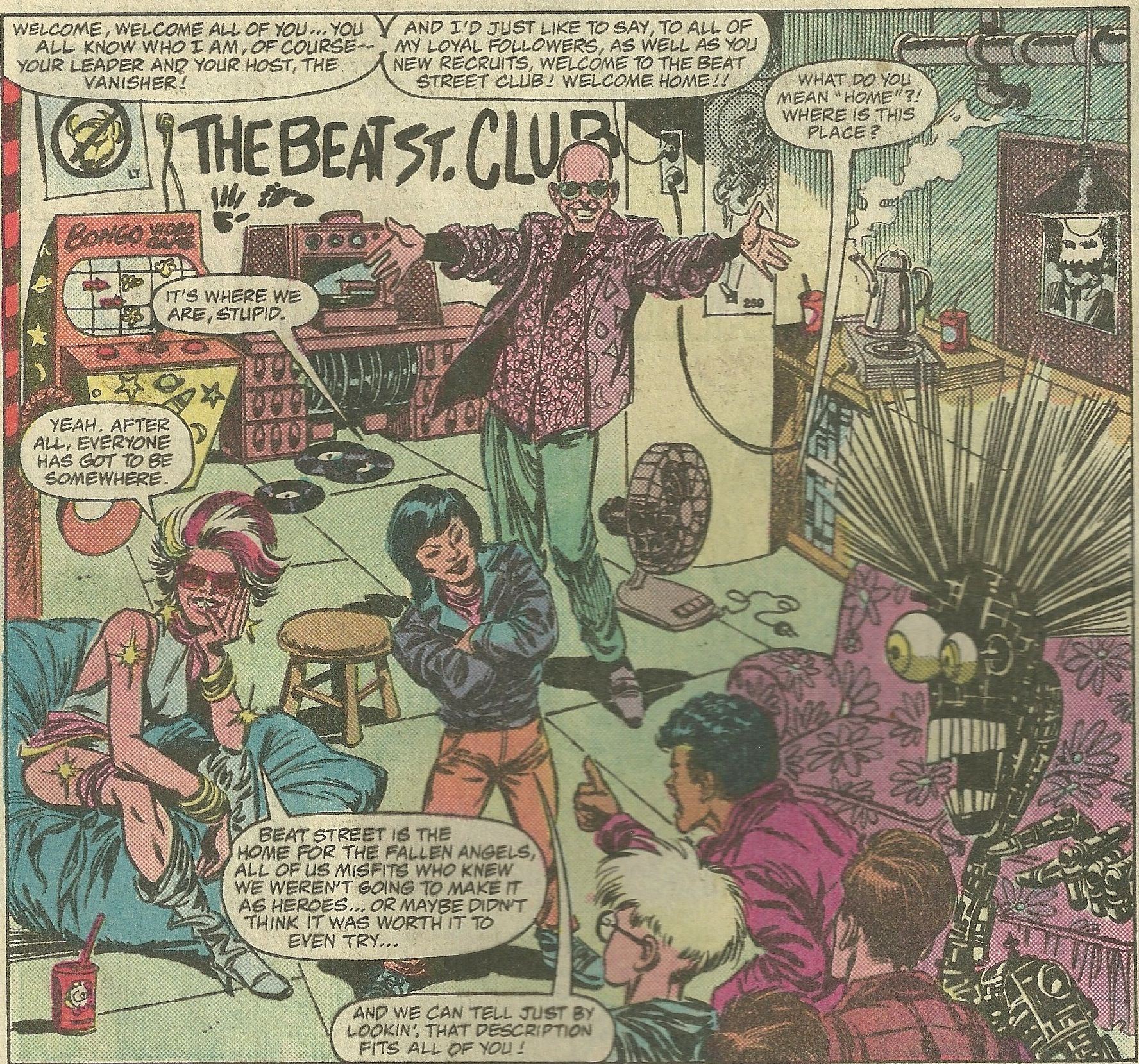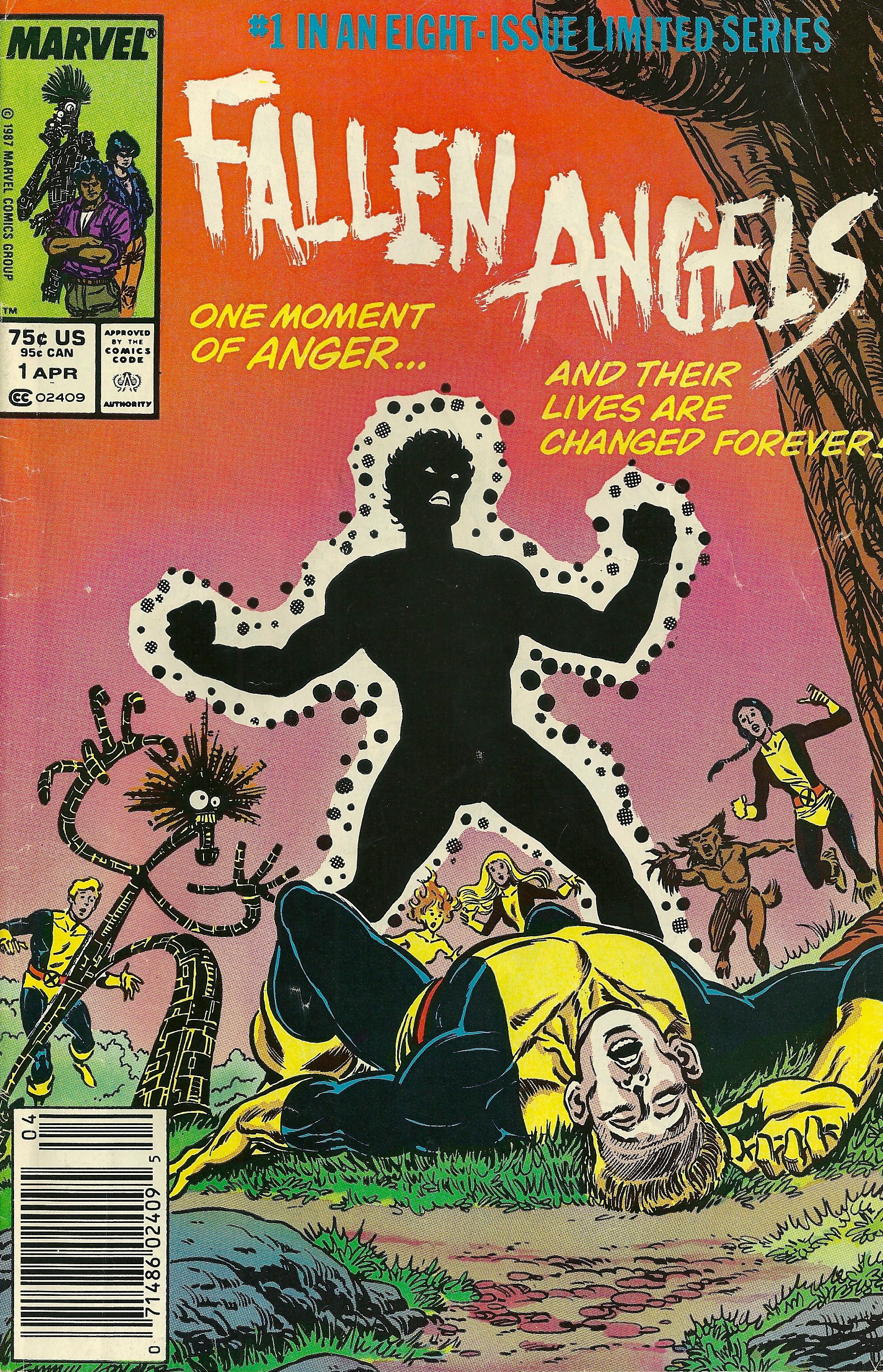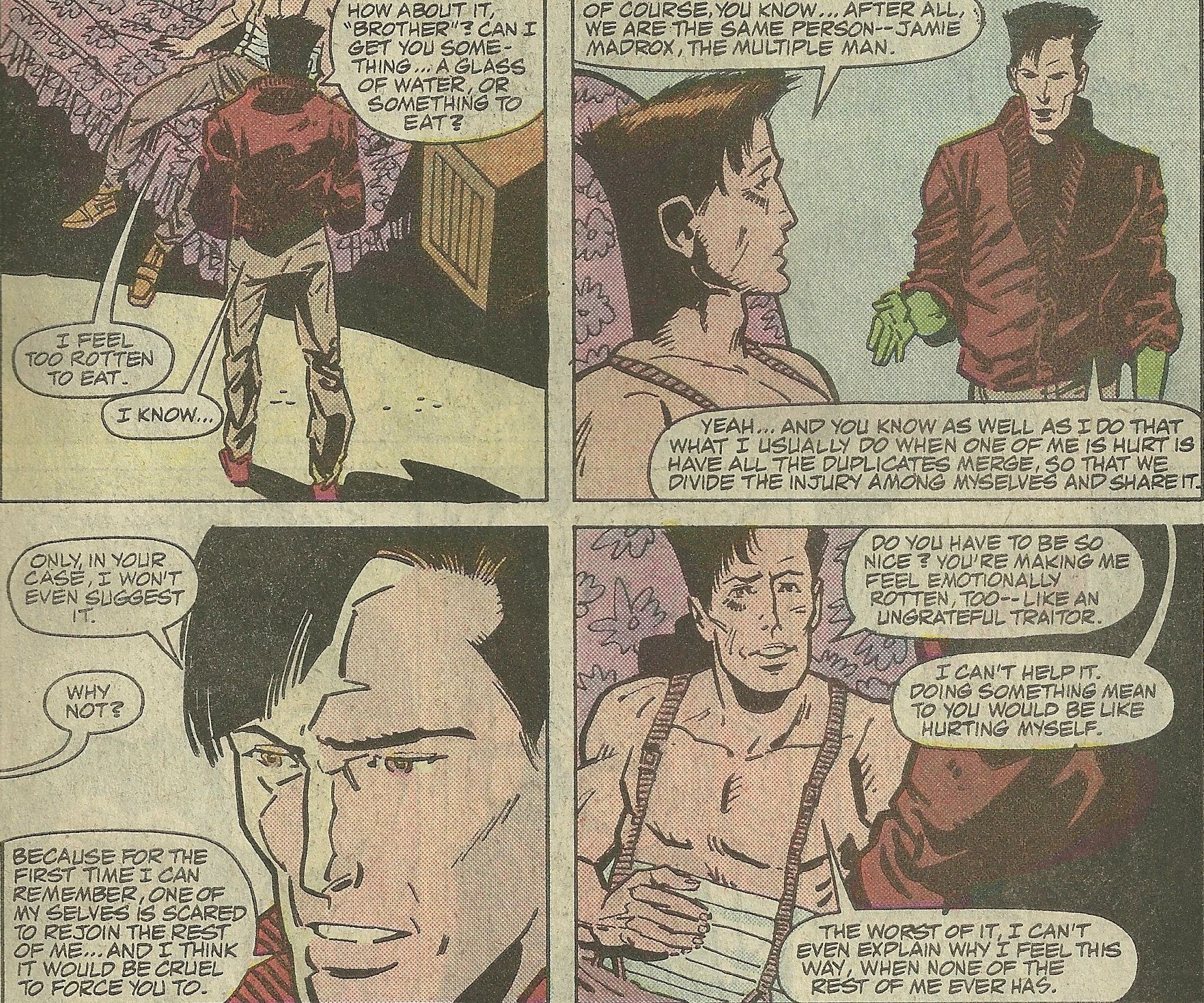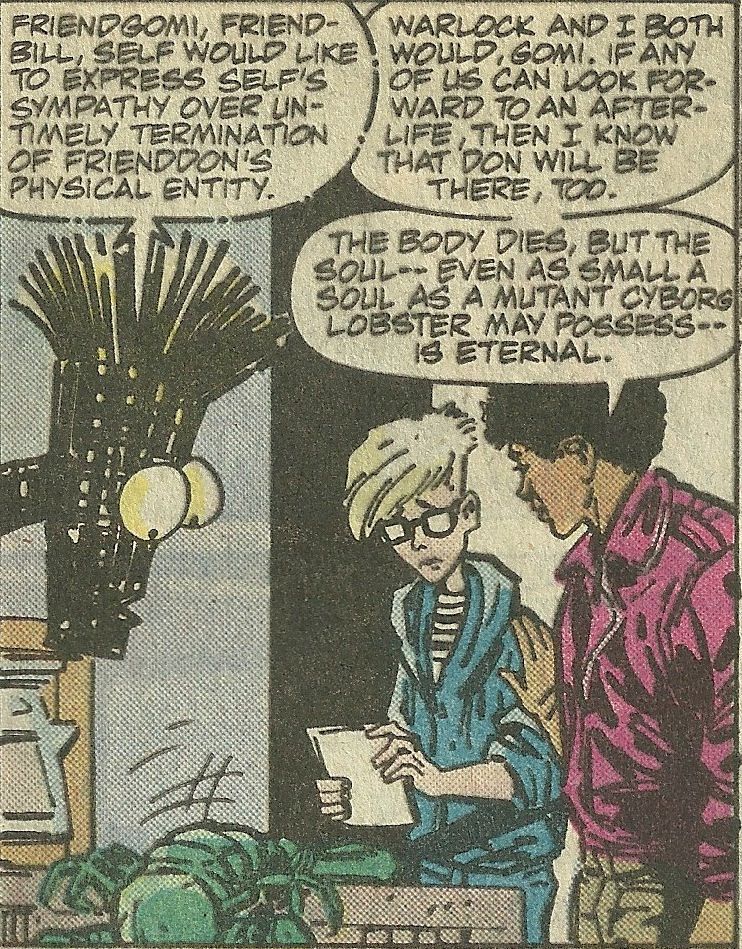Fallen Angels #1-8 (Marvel) by Jo Duffy, Kerry Gammill (#1-2, 4, 7), Marie Severin (#3), Joe Staton (#5-6, 8), Tom Palmer (#1-3, 7), Val Mayerik (#4-6), Tony DeZuniga (#8), Petra Scotese, Jim Novak (#1-2), Bill Oakley (#3, 5-8), L.P. Gregory (#4), and Ann Nocenti
As a story about a group of misfit superpowered kids, it's appropriate that Fallen Angels would be something of a misfit superhero series, too. It's not at all a bad comic, but it doesn't look, feel, or move like your typical cape-and-cowl adventure. Its cast is cobbled together from characters old and new, popular (at the time, at least) and obscure, and the characters are constantly butting heads with one another. This internal conflict leaves little room for external enemies, so there aren't really any villains for the stars to face until the last couple issues. There also aren't a lot of codenames or costumes used; even Sunspot, the protagonist and narrator, is referred to by his real name, Roberto "Bobby" da Costa, more often than not. It's a non-traditional team with mixed morals and motives, not fighting for good or evil but merely sticking together for the sake of survival and some semblance of friendship/family. Fallen Angels is a coming-of-age story for the entire titular team, and it is more interested in studying human behavior than the high-powered violence of the average superhero tale. In this story, being a teenager comes first, and having powers comes second, an interesting and unusual prioritization that makes for an entertaining if not astonishing read.
The book takes its time in setting up the narrative, not even introducing the Fallen Angels as a group until issue #2, and not filling out the roster until the series is half over. There is a traitor-in our-midst plot that ties the whole thing together, but it only gets hinted at faintly for the first several issues, then takes over completely for the final two chapters, once the series has had time to slowly but surely complete its lineup and introduce all the new characters to the audience. There are three all-new, original characters created for this team: Chance, Ariel, and Gomi. Actually, I suppose you have to count Don and Bill, Gomi's pet cyborg lobsters, so five new characters in all. They're an odd bunch, each playing a recognizable teenager role; Chance is the angsty rebel, Ariel the charismatic and popular leader, and Gomi the awkward, understanding nerd. They are ostensibly led by old-school X-Men villain Vanisher, since he's the resident adult, but in truth it is Ariel who runs things. She has the power to convince anyone who hears her that whatever she says is true, reasonable, and even wise, so she pretty much always gets her way. It makes her an effective peacekeeper in a group with a lot of ill-mixing personalities, but it also positions her to ultimately betray them all.
Sunspot meets the Fallen Angels after running away from his home at Xavier's School. In the middle of a friendly free time soccer match with the rest of the New Mutants, Roberto collides with Sam Guthrie/Cannonball and gets hurt. He reacts rashly, powering up his solar-fueled super-strength and flinging Sam headfirst into a tree. It's an all-too-relatable scene of play turning serious too quickly when someone gets injured and/or mad. Kids' tempers are the worst, and Roberto is only 14, plus he's dealing with a father who's turned villain, and he has a naturally short fuse. When his temper flares, it's explosive, and though he cools off just as quickly, the damage is already done. Sam recovers before long, but is knocked unconscious in the moment, and the other New Mutants lash out at Roberto in anger that barely masks their fear. He then overreacts to their overreaction with excessive guilt and self-deprecation, deciding that this one awful act has permanently defined him as a bad person. So he flees, no longer feeling like he belongs with the team of young heroes.
Instead, he joins up with a team of young...ne'er-do-wells? I don't know how to categorize the Fallen Angels, exactly. "Lost souls" is probably the most fitting label, but I'm not crazy about it as a phrase. The point is that they're neither good guys nor bad, just a collection of kids with nowhere else to go and nothing better to do than bicker, steal, and hang out together. Oh, and they also all have superpowers, although Chance doesn't know about hers until the end of the series. How they initially formed as a group is a little vague, but the real reason for their existence is that Ariel is trying to round up a bunch of mutants so she can sell them to the people of her homeworld, the hilariously-named Coconut Grove. So the Fallen Angels grow gradually larger with each issue of the series' first half, and in the end it's quite the unruly roster. In addition to those I've already named, there's Warlock, Multiple Man/Jamie Madrox, and Theresa Cassidy/Siryn, all of whom join in an effort to either bring Roberto home or at least keep an eye on him. Warlock does this on his own, basically becoming a second New Mutant runaway, so Magento
(who was left in charge of Xavier's students back in 1987) asks Siryn and Madrox to find his missing kids and bring them back. Instead, they settle for finding them and keeping them safe from within the Fallen Angels. Boom-Boom also comes aboard, though technically she was already part of them team before Roberto and company, but then she got snagged by X-Factor, so the Fallen Angels show up and rescue her. Finally, just to really ice the cake, Ariel—through her incredibly useful power of making any door lead to any other door at will—transports the whole team to the home planet of Devil Dinosaur and Moon Boy, recruiting them somehow despite the never-penetrated language barrier.
As the gang assembles, Fallen Angels acts more like a dysfunctional family comedy than a superhero team origin story. Everyone gets on everyone else's nerves, and there's incessant sniping and fuming and storming off. In between the petty arguments and additions to the cast, the series serves as a discussion/exploration of the many shades of human morality. Roberto joins the Fallen Angels because he views himself as a failed hero, too angry and rotten inside to ever truly do any good in the world. Yet compared to other members of the Fallen Angels, Roberto's inner decency becomes much clearer, for the reader if not for the boy himself. Ariel reveals early on that she's being less than honest with her teammates about her long-term plans, and we also discover that Chance is in on Ariel's scheme, helping her track down mutants in exchange for a cut of the final sale. While Ariel is pretty enthusiastic about the treachery, and even appears to enjoy it in places, Chance struggles more and more with it as she grows closer to Roberto. Even as co-conspirators, then, Ariel and Chance have different perspectives, different levels of commitment and comfort when it comes to their darker sides, their more questionable actions.
Vanisher, on the other hand, is just as wicked as either Chance or Ariel, but in a less harmful way, and far more open about it. He seems to think he's being sneaky at times, but nobody ever buys his bull. When things are good, he's there barking orders at everybody, acting like a hardnosed leader whipping his troops into shape, when really he's just a weird old man attempting to trick teenagers into stealing his meals for him and keeping him comfortable. They do what he says primarily because it's easier than fighting with him about it, and most of his demands are what everyone wants anyway: more food, a clean living space, etc. He commands no respect whatsoever, because whenever there's even the suggestion of danger, he pulls his one-and-only super-trick and teleports right the hell out of Dodge. The rest of the Angels know he's a coward, call him out on it even, but he pretends not to notice and goes right back to playing the tyrant. His is a tragicomic brand of evil, unambitious and mostly harmless, more obvious than Ariel's backhanded approach, and therefore less dangerous.
On the other side of the spectrum are Siryn, Devil Dinosaur, and Moon Boy, a trio so good and wholesome it hurts. Siryn, especially, is good to her core, concerned for and protective of all the Fallen Angels immediately. She's the most unwaveringly heroic character in the book, and also the most self-assured. While many of the younger characters wrestle with their self-identities, Siryn always knows herself, making her a natural, effortless leader and therefore a perfect counterbalance for Vanisher. Gomi and Warlock both epitomize loyalty, but Warlock is a curious outgoing investigator while Gomi is a somewhat cold, introverted academic. So while they represent a similar attitude, their expressions of it differ greatly.
Boom-Boom lands somewhere in the middle, morality-wise. She's well-meaning but also likes to stir things up, a lovable rascal if ever there was one. Which leaves Madrox, who's basically just a run-of-the-mill good guy with a splash of self-doubt, but what he brings to this series is less about morals and more about agency and independence. One of his doubles, for the first time ever, decides it does not want to rejoin him, refusing to be absorbed back into the "main" Madrox and surrender his own sense of self. Eventually this is explained as a mutation of Madrox's original mutation, and the primary Madrox is cool enough to respect the desires of his rogue double. It's similar to his and Siryn's decision not to force Roberto and Warlock to return to the New Mutants, and the emphasis placed on independence in this story is a big part of its core message, as is the morally diverse cast.
Fallen Angels is about letting people be themselves, flaws and all, and allowing them to make their own mistakes and take whatever lumps they have to. Because, according to the philosophy of this series, anyway, if given the chance and the right opportunities, people will be good and protect one another in the end. Speaking of the end, Ariel makes her move at the close of issue #6, whisking the team to Coconut Grove without so much as a warning, and turning them over to the planet's leader, Unipar, so he can dissect and otherwise invasively study them. The inhabitants of Coconut Grove haven't had a mutant in millions of years, their genes somehow stabilizing beyond all deviation. Over time, this has turned into a weird obsession with mutation, a lust for it, so the Fallen Angels are meant to be test subjects in Unipar's desperate search for what causes it. The Coconut Grove is where Chance's mutant powers are revealed, the ability to either turn off or enhance the mutant powers of others, so she gets captured along with everyone else. And Ariel, who believes she's safe because her door-to-door teleportation powers are something everyone from the Coconut Grove can do, learns that her magically persuasive voice is the result of a mutation, so even she becomes a target of Unipar's campaign.
If you haven't guessed it yet, the team pulls together to break free of Unipar's grasp and show him how crazy he's been. At which point, in order to return things to the status quo at the end of this mini-series, Roberto and Warlock decide to rejoin the New Mutants, having learned that a person's moral fiber cannot be defined by a single action. These teammates of theirs who were selfish and deceptive at first rallied when it mattered. Yes, ok, it took them having their own lives threatened, but the lesson is learned nevertheless. Acting badly led to even worse results, and working as a team saved the day, so everyone walks away with a greater appreciation for the value of honest and decent behavior. Well, maybe not Vanisher, but he's the big dumb bad guy clown from start to finish, so that's fine.
There are other little chunks of life lesson candy mixed in with the ice cream of being good and respecting other people. One of Gomi's lobsters, Don, is stepped on accidentally by Devil Dinosaur and straight up dies. Instantly, crunch, no questions asked. Gomi then has to a) comes to terms with the death of one of his two best friends, b) council his other best friend through the same grieving process because Gomi is a human and his best friends are lobsters so they need him emotionally, and c) try to forgive a new teammate with whom he cannot even communicate for killing one of his best friends. Mortality, forgiveness, coping with loss—these are heavy issues, handled with just the right mix of serious contemplation and comicbook fantasy to lighten the mood. In his despair, Gomi also develops a small crush on Siryn, which mirrors the crush Boom-Boom develops for Madrox right when they first meet. It's puppy love, a little inappropriate but not really hurting anyone, because both Madrox and Siryn are careful not to do anything that might be misunderstood as encouragement. Here, too, is a mini after-school special, this time about romantic maturity. And as I've mentioned, Vanisher is basically a walking (and teleporting) cautionary tale, a warning against the sad, lonely, sparse life of someone who thinks only of himself.
All these elements make me think Fallen Angels might function best as a comic for children and/or young adults. I enjoyed it as a grown-up, and there's universal appeal, but there's more to be gained from it if you're still impressionable and unjaded. It gives the reader examples of all kinds of people, pure good and pure evil and many different blends of the two, but depicts everybody as partially likable and, more importantly, redeemable. People can learn, says Fallen Angels, and through learning they can truly, permanently change for the better. It's optimistic, perhaps more so than humanity deserves, but it avoids being hamfisted or sappy in its delivery, and that's something I always endorse. Positivity and a message of hope, acceptance, and cooperation that doesn't overbear...yes, this is definitely what our kids should be reading.




